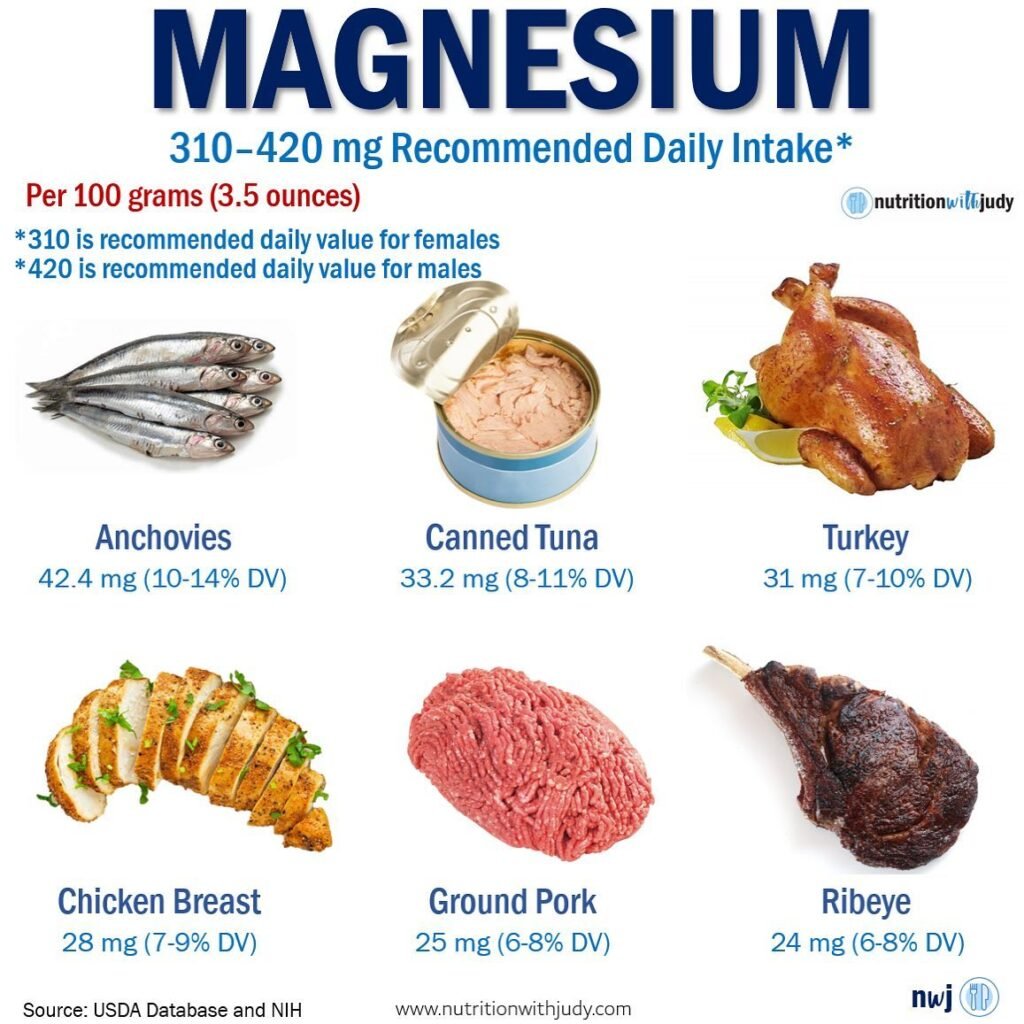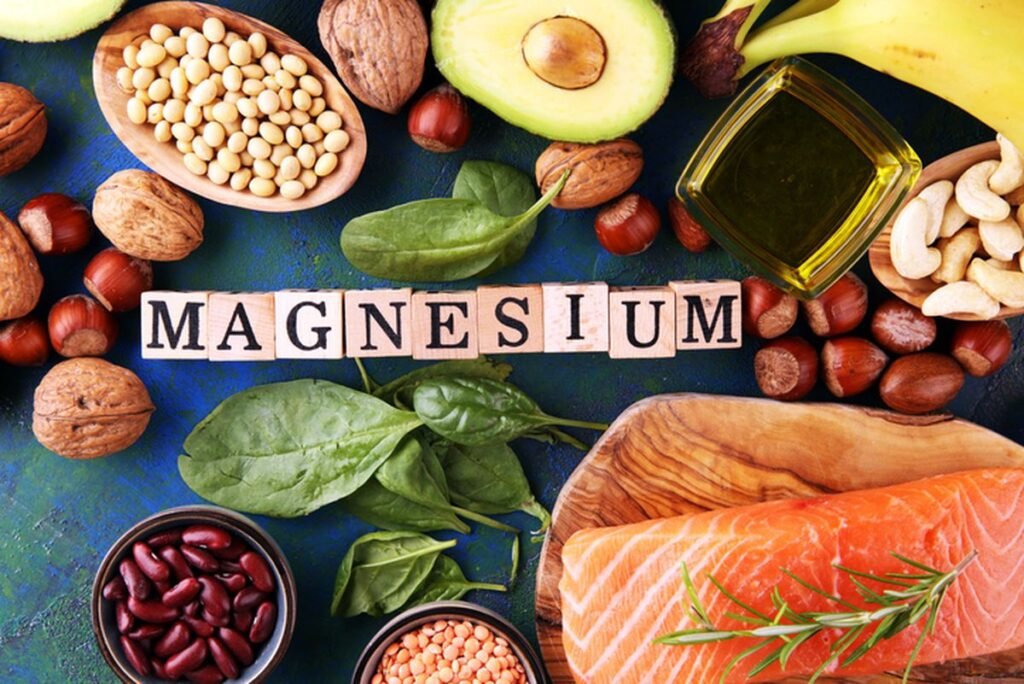Avoid Magnesium Deficiency: 7 Benefits for Holistic Health

As a Wellness Warrior, understanding the importance of essential minerals in our body is crucial for maintaining optimal health. Among these minerals, magnesium stands out as a true powerhouse, playing a vital role in numerous bodily functions. In this comprehensive guide, we’ll explore why magnesium is so important for the body and how it contributes to overall wellness.
Magnesium is an essential mineral and chemical element with the symbol Mg and atomic number 12. We need to avoid magnesium deficiency. It is classified as an alkaline earth metal and is characterized by its shiny gray appearance and low density, making it a lightweight yet strong metal.
Magnesium plays a crucial role in numerous biological processes and is vital for human health. In nature, magnesium is the eighth most abundant element in the Earth’s crust, but due to its high reactivity, it does not occur in its elemental form. Instead, it is found in various compounds and minerals such as dolomite, magnesite, and carnallite. Magnesium is also present in seawater, primarily as magnesium chloride.

Biologically, magnesium is indispensable, acting as a cofactor for over 300 enzyme systems that regulate diverse biochemical reactions. It is crucial for energy production, protein synthesis, muscle and nerve function, blood glucose control, and blood pressure regulation. Magnesium is also essential for bone health, DNA synthesis, and maintaining a normal heart rhythm.
Industrially, magnesium finds applications in various sectors due to its lightweight nature and unique properties. It is extensively used in the automotive and aerospace industries to reduce weight and improve fuel efficiency. Magnesium also plays a significant role in electronics manufacturing, healthcare, and renewable energy applications.
The Fundamental Role of Magnesium in Human Body Biochemistry
Magnesium is an abundant mineral in the human body, involved in over 600 biochemical reactions. This essential mineral is crucial for maintaining various physiological processes, making it a key player in our overall health and well-being.
Energy Production: The Powerhouse Mineral

One of the most fundamental roles of magnesium is its involvement in energy production. Magnesium is required by the adenosine triphosphate (ATP)-synthesizing protein in mitochondria, our cellular powerhouses. ATP, the primary energy carrier in cells, exists mainly as a complex with magnesium (MgATP). This means that without sufficient magnesium, our body’s energy production would be severely compromised, affecting every aspect of our physical and mental performance.
Nucleic Acid and Protein Synthesis: The Building Blocks of Life

Magnesium is necessary for the synthesis of DNA, RNA, and proteins. It acts as a cofactor for enzymes involved in these processes, ensuring proper cellular function and replication. This role is crucial for growth, repair, and maintenance of our body’s tissues and organs.
Ion Transport and Cell Signaling: The Communication Facilitator

Magnesium is essential for the active transport of ions like potassium and calcium across cell membranes. This function is critical for nerve impulse conduction, muscle contraction, and maintaining normal heart rhythm. Without enough magnesium, our nervous system and cardiovascular system would struggle to function properly.
Structural Functions: The Skeletal Supporter

Approximately 50-60% of the body’s magnesium is found in the skeleton, highlighting its importance in bone health . Magnesium contributes to the structural integrity of bones, cell membranes, and chromosomes. This makes it a crucial mineral for maintaining strong bones and preventing conditions like osteoporosis.
Magnesium and Cardiovascular Health: Protecting Your Heart
Magnesium plays a crucial role in maintaining cardiovascular health. It helps regulate blood pressure and supports normal heart function, making it an essential mineral for heart health.
Blood Pressure Regulation

Magnesium helps promote endothelium-dependent blood vessel dilation and reduces inflammation . This action contributes to the regulation of blood pressure, potentially lowering the risk of hypertension. Studies have shown that magnesium supplementation can help reduce high blood pressure, a significant risk factor for heart disease.
Heart Rhythm Regulation

Magnesium plays a vital role in modulating ionic channels, which are critical for cardiac responsiveness and the regulation of heart rhythms . Low magnesium levels are associated with an increased risk of irregular heartbeat and other cardiovascular issues such as arrhythmias and coronary artery disease.
Reducing Risk of Cardiovascular Disease

A 2021 review indicated that magnesium supplements could help improve multiple risk factors for heart disease, including cholesterol levels . Additionally, magnesium’s role in preventing platelet accumulation and promoting anticoagulation further supports its cardiovascular benefits, potentially reducing the risk of heart attack and cardiac arrest.
Magnesium and Diabetes Management: Balancing Blood Sugar
Magnesium is essential for glucose metabolism and insulin sensitivity, making it a crucial mineral for diabetes management and prevention.
Improving Insulin Sensitivity

Studies suggest that about 48% of people with type 2 diabetes have low blood levels of magnesium, which can impair the body’s ability to regulate blood sugar levels effectively . Magnesium supplements have been shown to enhance insulin sensitivity and improve blood sugar control in individuals with diabetes or prediabetes.
Reducing Risk of Type 2 Diabetes

A meta-analysis found that increasing dietary magnesium intake is associated with a reduced risk of type 2 diabetes. This highlights the importance of maintaining adequate magnesium levels through diet or supplementation for those at risk of developing diabetes.
Magnesium and Mental Health: Nurturing Your Mind
Magnesium plays a critical role in brain function and mood regulation, making it an important mineral for mental health.
Depression and Anxiety

Low magnesium levels have been linked to an increased risk of depression and anxiety. Magnesium deficiency may exacerbate stress and depression, while supplementation has been shown to improve symptoms of depression
Stress Management
A 2020 review suggested that stress might deplete magnesium, increasing susceptibility to stress and depression . This creates a vicious cycle where stress depletes magnesium, and low magnesium levels increase susceptibility to stress.
Magnesium Deficiency: A Hidden Epidemic
Despite its importance, magnesium deficiency is surprisingly common. In the United States, it is estimated that about half of the adult population does not consume enough magnesium to meet the recommended dietary allowances (RDA).
Symptoms of Magnesium Deficiency
The symptoms of magnesium deficiency can vary from mild to severe and include:
● Muscle cramps
● Fatigue
● Weakness
● Abnormal heart rhythms
● Tremors
● Muscle spasms
In severe cases, magnesium deficiency can lead to more serious health issues such as hypocalcemia (low calcium levels), hypokalemia (low potassium levels), and neurological symptoms.
Risk Factors for Magnesium Deficiency
Several factors increase the risk of magnesium deficiency:
● Poor dietary intake
● Gastrointestinal disorders
● Renal disorders
● Chronic alcoholism
● Use of certain medications like proton pump inhibitors
Older adults are particularly at risk due to decreased dietary intake and increased urinary excretion of magnesium. Additionally, pregnant women and women with hormone-related conditions are at higher risk due to increased magnesium requirements and hormonal influences on magnesium utilization.
Dietary Sources of Magnesium: Fueling Your Body Naturally
Ensuring adequate magnesium intake through diet is the best way to maintain optimal magnesium levels.
Here are some excellent dietary sources to avoid magnesium deficiency:
Plant-Based Sources
- Nuts and Seeds: Almonds, cashews, and pumpkin seeds are particularly high in magnesium. A 1-
ounce serving of almonds contains about 80 mg of magnesium, which is 20% of the daily value . - Legumes: Beans, lentils, and chickpeas are excellent sources. A cup of cooked black beans provides approximately 120 mg of magnesium.
- Whole Grains: Foods like brown rice, quinoa, and whole wheat bread are rich in magnesium. A cup of
cooked quinoa contains about 118 mg of magnesium. - Leafy Greens: Spinach and Swiss chard are among the top sources, with a cup of cooked spinach
providing 158 mg of magnesium. - Fruits: Avocados and bananas are good sources, with a medium avocado providing 58 mg of
magnesium.
READ MORE: Can we get collagen with PLANT BASED INGREDIENTS?
Animal-Based Sources

- Fish: Fatty fish such as salmon and mackerel are good sources. A 3.5-ounce serving of cooked
salmon contains about 30 mg of magnesium. - Dairy Products: Milk and yogurt also contribute to magnesium intake, with an 8-ounce serving of low fat yogurt providing about 42 mg of magnesium.
Other Sources
Dark Chocolate: Contains about 65 mg of magnesium per 1-ounce serving, making it a delicious way to boost magnesium intake.

Fortified Foods: Some breakfast cereals and other fortified foods can also be significant sources of magnesium.
Magnesium Supplements: When Diet Isn’t Enough
While obtaining magnesium from food sources is generally preferred, supplements can be useful for correcting deficiencies or addressing specific health conditions. There are several types of magnesium supplements available to avoid magnesium deficiency, each with its own benefits and uses:
1. Magnesium Citrate
Magnesium citrate is one of the most commonly used magnesium supplements due to its high bioavailability . It’s often used to treat constipation and to correct magnesium deficiencies .
2. Magnesium Oxide
Magnesium oxide has a high magnesium content per weight but low bioavailability . It’s often used as an antacid to relieve heartburn and indigestion .
3. Magnesium Chloride
Magnesium chloride is well absorbed in the digestive tract, making it a good option for treating low magnesium levels . It’s available in both oral and topical forms.
4. Magnesium Glycinate
Magnesium glycinate is highly bioavailable and is often used for its calming effects to treat anxiety, depression, and insomnia . It’s less likely to cause digestive issues, making it a safe choice for long-term supplementation.
5. Magnesium L-Threonate
Magnesium L-threonate is known for its potential brain health benefits. It may increase magnesium concentrations in brain cells, potentially aiding in the treatment of brain disorders such as depression and Alzheimer’s disease .
Recommended Daily Allowance and Upper Limit
The Recommended Dietary Allowance (RDA) for magnesium varies by age, sex, and life stage:
- Men aged 19-30: 400 mg/day
- Men aged 31 and older: 420 mg/day
- Women aged 19-30: 310 mg/day
- Women aged 31 and older: 320 mg/day
- Pregnant women: 350-360 mg/day
- Lactating women: 310-320 mg/day
It’s important to note that while magnesium is generally safe, excessive intake from supplements can cause side effects such as diarrhea, nausea, and abdominal cramping. The upper limit for magnesium deficiency from supplements is 350 mg per day for adults.
Embracing Magnesium for Optimal Wellness
As Wellness Warriors, understanding the importance to avoid magnesium deficiency in our bodies is crucial for maintaining optimal health. From energy production and protein synthesis to cardiovascular health and mental well-being, magnesium plays a vital role in numerous bodily functions.
Ensuring adequate magnesium intake through a balanced diet rich in whole grains, leafy greens, nuts, and seeds is the best approach to avoid magnesium deficiency. For those with deficiencies or specific health conditions, magnesium supplements can be a valuable addition to their wellness routine.
Remember, while magnesium is essential for good health, it’s always best to consult with a healthcare provider before starting any new supplement regimen. They can help determine your individual needs and ensure that magnesium supplementation is safe and appropriate for you.
By embracing the power of magnesium, we can take a significant step towards better health, increased energy, and overall wellness. As Wellness Warriors, let’s make magnesium a key player in our journey to optimal health and vitality.

